

Difference between Theoretical and Empirical Research
The difference between theoretical and empirical research is fundamental to scientific, scholarly research, as it separates the development of ideas and models from their testing and validation.
These two approaches are used in many different fields of inquiry, including the natural sciences, social sciences, and humanities, and they serve different purposes and employ different methods.
Table of Contents
What is theoretical research.
Theoretical research involves the development of models, frameworks, and theories based on existing knowledge, logic, and intuition.
It aims to explain and predict phenomena, generate new ideas and insights, and provide a foundation for further research.
Theoretical research often takes place at the conceptual level and is typically based on existing knowledge, data, and assumptions.
What is Empirical Research?
In contrast, empirical research involves collecting and analysing data to test theories and models.
Empirical research is often conducted at the observational or experimental level and is based on direct or indirect observation of the world.
Empirical research involves testing theories and models, establishing cause-and-effect relationships, and refining or rejecting existing knowledge.
Theoretical vs Empirical Research
Theoretical research is often seen as the starting point for empirical research, providing the ideas and models that must be tested and validated.
Theoretical research can be qualitative or quantitative and involve mathematical models, simulations, and other computational methods.
Theoretical research is often conducted in isolation, without reference to primary data or observations.
On the other hand, empirical research is often seen as the final stage in the scientific process, as it provides evidence that supports or refutes theoretical models.
Empirical research can be qualitative or quantitative, involving surveys, experiments, observational studies, and other data collection methods.
Empirical research is often conducted in collaboration with others and is based on systematic data collection, analysis, and interpretation.
It is important to note that theoretical and empirical research are not mutually exclusive and can often complement each other.
For example, empirical data can inform the development of theories and models, and theoretical models can guide the design of empirical studies.
The most valuable research combines theoretical and empirical approaches in many fields, allowing for a comprehensive understanding of the studied phenomena.
It is important to note that this table is not meant to be exhaustive or prescriptive but rather to provide a general overview of the main difference between theoretical and empirical research.
The boundaries between these two approaches are not always clear, and in many cases, research may involve a combination of theoretical and empirical methods.
What are the Limitations of Theoretical Research?
Assumptions and simplifications may be made that do not accurately reflect the complexity of real-world phenomena, which is one of its limitations. Theoretical research relies heavily on logic and deductive reasoning, which can sometimes be biased or limited by the researcher’s assumptions and perspectives.
Furthermore, theoretical research may not be directly applicable to real-world situations without empirical validation. Applying theoretical ideas to practical situations is difficult if no empirical evidence supports or refutes them.
Furthermore, theoretical research may be limited by the availability of data and the researcher’s ability to access and interpret it, which can further limit the validity and applicability of theories.
What are the Limitations of Empirical Research?
There are many limitations to empirical research, including the limitations of the data available and the quality of the data that can be collected. Data collection can be limited by the resources available to collect the data, accessibility to populations or individuals of interest, or ethical constraints.
The researchers or participants may also introduce biases into empirical research, resulting in inaccurate or unreliable findings.
Lastly, due to confounding variables or other methodological limitations, empirical research may be limited by the inability to establish causal relationships between variables, even when statistical associations are identified.
What Methods Are Used In Theoretical Research?
In theoretical research, deductive reasoning, logical analysis, and conceptual frameworks generate new ideas and hypotheses. To identify gaps and inconsistencies in the present understanding of a phenomenon, theoretical research may involve analyzing existing literature and theories.
To test hypotheses and generate predictions, mathematical or computational models may also be developed.
Researchers may also use thought experiments or simulations to explore the implications of their ideas and hypotheses without collecting empirical data as part of theoretical research.
Theoretical research seeks to develop a conceptual framework for empirically testing and validating phenomena.
What Methods Are Used In Empirical Research?
Methods used in empirical research depend on the research questions, type of data collected, and study design. Surveys, experiments, observations, case studies, and interviews are common methods used in empirical research.
An empirical study tests hypotheses and generates new knowledge about phenomena by systematically collecting and analyzing data.
These methods may utilize standardized instruments or protocols for data collection consistency and reliability. Statistical analysis, content analysis, or qualitative analysis may be used for the data collection type.
As a result of empirical research, the findings can inform theories, models, and practical applications.
Conclusion: Theoretical vs Empirical Research
In conclusion, theoretical and empirical research are two distinct but interrelated approaches to scientific inquiry, and they serve different purposes and employ different methods.
Theoretical research involves the development of ideas and models, while empirical research involves testing and validating these ideas.
Both approaches are essential to research and can be combined to provide a more complete understanding of the world.
- Dictionary.com. “ Empirical vs Theoretical “.
- PennState University Libraries. “ Empirical Research in the Social Sciences and Education “.
- William M. Landes and Richard A. Posner. “ Legal Precedent: A Theoretical and Empirical Analysis “, The Journal of Law and Economics, 1976.
Read more articles

Theoretical vs. Empirical — What's the Difference?
Difference Between Theoretical and Empirical
Table of contents, key differences, comparison chart, primary focus, compare with definitions, theoretical, common curiosities, how do theoretical and empirical research interact, what is empirical research, what is theoretical research, why is theoretical research important, how do researchers collect data in empirical studies, how has theoretical research evolved, can a study be both theoretical and empirical, what role does statistical analysis play in empirical research, what challenges do theoretical researchers face, can empirical research refute a theory, why is empirical research important, what is an example of empirical research impacting society, what is an example of theoretical research impacting society, what challenges do empirical researchers face, how has empirical research evolved, share your discovery.

Author Spotlight
Popular Comparisons

Trending Comparisons

New Comparisons

Trending Terms


Henry Whittemore Library
Research skills hub.
- Click on a section, choose a topic. On computers, page opens on the right. On mobile, scroll past menu to read.
- Who are Our 'Experts'?
- The Information Timeline
- Peer Review
- The Internet vs. Academic Databases
- What kind of Info is in Databases?
- What's in OUR Library's Collection? This link opens in a new window
- Data vs Information
- Popular vs. Scholarly
- Grey Literature
- Primary, Secondary, Tertiary Sources
- What KIND of Info do You Need?
- Find & Narrow Topics
- Keywords from your Topic
- Concept / Mind Mapping
- Advanced Database Features
- Use Boolean Connectors
- Use Phrases
- Use Database Fields
- Use Truncation
- Use Database Limiters
- Use Synonyms
- Use Wildcards
- Use Database Subjects
- Find Better Keywords DURING Your Search
- Find Primary HISTORICAL sources via date limiting
- Google Advanced Search Tricks
- Search Google Scholar
- Reference Mining
- Citation Tracking
- About Call Numbers
- Periodical's Content Not the Same as the Periodical's Website!
- From a scholarly journal - But what IS it??
- Anatomy of a Scientific Research Article
- Quantitative vs Qualitative Research Articles
- Theoretical vs Empirical Research Articles
Theoretical vs Empirical Articles
- Types of Review Articles
- Identify the Research Study Type
- Spotting Bad Science
- Types of Scientific Evidence
- Found it in a newspaper - What is it??
- More About News Evaluation
- Webste Evaluation
- Fear & Loathing on Social Media
- Pseudoscience on Social Media -the Slippery Slope
- Getting Full Text During Library Site Searches
- Find Free Full Text on the Internet
- Got a Citation? Check the Library for Full Text
- Make an Interlibrary Loan (ILL) Request
- Better Organize What You Found
- Organize with Zotero
- Organize with Google Docs
- Organize using personal accounts in databases
- Just store stuff on your laptop?
- Print / Save as PDF Website Info Without the Ads
- Avoid Plagiarism
- Why SO MANY citation systems?
- Why Citations in the Text?
- Citing vs Attribution
- Paraphrase Correctly
- Create a Bibliography
- Create an Annotated Bibliography
- Our Complete Citation Guide This link opens in a new window
Theoretical Research is a logical exploration of a system of beliefs and assumptions, working with abstract principles related to a field of knowledge.
- Essentially...theorizing
Empirical Research is based on real-life direct or indirect observation and measurement of phenomena by a researcher.
- Basically... Collecting data by Observing or Experimenting

- << Previous: Quantitative vs Qualitative Research Articles
- Next: Types of Review Articles >>
- Last Updated: Oct 23, 2024 12:26 PM
- URL: https://library.framingham.edu/research-skills-hub
Library Socials
Contact us:.
[email protected] Phone: (508) 626-4650 [email protected] Phone: (508) 626-4654
Search this site
Theoretical vs. Empirical: Know the Difference
Key Differences
Comparison Chart
Basis of knowledge, method of validation, application, theoretical and empirical definitions, theoretical, repeatedly asked queries, can empirical research test a theoretical model, do theoretical scientists perform experiments, why is the theoretical importance in science, can empirical studies contribute to theory, what is an empirical observation, what's an example of theoretical physics, can theoretical work be disproven, what makes an empirical study scientific, what is a theoretical model, how are theoretical conclusions reached, is empirical evidence always reliable, are empirical methods limited to quantitative data, what role do experiments play in empirical research, how do theoretical perspectives influence research, can an empirical approach be used in social sciences, are all scientific theories based on empirical data, is theoretical knowledge necessary for empirical research, how does empirical evidence affect theories, can theories change with new empirical findings, is there empirical research in mathematics, share this page.

Popular Comparisons

Trending Comparisons

Featured Comparisons

New Comparisons

Conceptual Research vs. Empirical Research
What's the difference.
Conceptual research and empirical research are two distinct approaches to conducting research. Conceptual research focuses on exploring and developing theories, concepts, and ideas. It involves analyzing existing literature, theories, and concepts to gain a deeper understanding of a particular topic. Conceptual research is often used in the early stages of research to generate hypotheses and develop a theoretical framework. On the other hand, empirical research involves collecting and analyzing data to test hypotheses and answer research questions. It relies on observation, measurement, and experimentation to gather evidence and draw conclusions. Empirical research is more focused on obtaining concrete and measurable results, often through surveys, experiments, or observations. Both approaches are valuable in research, with conceptual research providing a foundation for empirical research and empirical research validating or refuting conceptual theories.
Further Detail
Introduction.
Research is a fundamental aspect of any field of study, providing a systematic approach to acquiring knowledge and understanding. In the realm of research, two primary methodologies are commonly employed: conceptual research and empirical research. While both approaches aim to contribute to the body of knowledge, they differ significantly in their attributes, methodologies, and outcomes. This article aims to explore and compare the attributes of conceptual research and empirical research, shedding light on their unique characteristics and applications.
Conceptual Research
Conceptual research, also known as theoretical research, focuses on the exploration and development of theories, concepts, and ideas. It is primarily concerned with abstract and hypothetical constructs, aiming to enhance understanding and generate new insights. Conceptual research often involves a comprehensive review of existing literature, analyzing and synthesizing various theories and concepts to propose new frameworks or models.
One of the key attributes of conceptual research is its reliance on deductive reasoning. Researchers start with a set of existing theories or concepts and use logical reasoning to derive new hypotheses or frameworks. This deductive approach allows researchers to build upon existing knowledge and propose innovative ideas. Conceptual research is often exploratory in nature, seeking to expand the boundaries of knowledge and provide a foundation for further empirical investigations.
Conceptual research is particularly valuable in fields where empirical data may be limited or difficult to obtain. It allows researchers to explore complex phenomena, develop theoretical frameworks, and generate hypotheses that can later be tested through empirical research. By focusing on abstract concepts and theories, conceptual research provides a theoretical foundation for empirical investigations, guiding researchers in their quest for empirical evidence.
Furthermore, conceptual research plays a crucial role in the development of new disciplines or interdisciplinary fields. It helps establish a common language and theoretical framework, facilitating communication and collaboration among researchers from different backgrounds. By synthesizing existing knowledge and proposing new concepts, conceptual research lays the groundwork for empirical studies and contributes to the overall advancement of knowledge.
Empirical Research
Empirical research, in contrast to conceptual research, is concerned with the collection and analysis of observable data. It aims to test hypotheses, validate theories, and provide evidence-based conclusions. Empirical research relies on the systematic collection of data through various methods, such as surveys, experiments, observations, or interviews. The data collected is then analyzed using statistical or qualitative techniques to draw meaningful conclusions.
One of the primary attributes of empirical research is its inductive reasoning approach. Researchers start with specific observations or data and use them to develop general theories or conclusions. This inductive approach allows researchers to derive broader implications from specific instances, providing a basis for generalization. Empirical research is often hypothesis-driven, seeking to test and validate theories or hypotheses through the collection and analysis of data.
Empirical research is highly valued for its ability to provide concrete evidence and support or refute existing theories. It allows researchers to investigate real-world phenomena, understand cause-and-effect relationships, and make informed decisions based on empirical evidence. By relying on observable data, empirical research enhances the credibility and reliability of research findings, contributing to the overall body of knowledge in a field.
Moreover, empirical research is particularly useful in applied fields, where practical implications and real-world applications are of utmost importance. It allows researchers to evaluate the effectiveness of interventions, assess the impact of policies, or measure the outcomes of specific actions. Empirical research provides valuable insights that can inform decision-making processes, guide policy development, and drive evidence-based practices.
Comparing Conceptual Research and Empirical Research
While conceptual research and empirical research differ in their methodologies and approaches, they are both essential components of the research process. Conceptual research focuses on the development of theories and concepts, providing a theoretical foundation for empirical investigations. Empirical research, on the other hand, relies on the collection and analysis of observable data to test and validate theories.
Conceptual research is often exploratory and aims to expand the boundaries of knowledge. It is valuable in fields where empirical data may be limited or difficult to obtain. By synthesizing existing theories and proposing new frameworks, conceptual research provides a theoretical basis for empirical studies. It helps researchers develop hypotheses and guides their quest for empirical evidence.
Empirical research, on the other hand, is hypothesis-driven and seeks to provide concrete evidence and support or refute existing theories. It allows researchers to investigate real-world phenomena, understand cause-and-effect relationships, and make informed decisions based on empirical evidence. Empirical research is particularly useful in applied fields, where practical implications and real-world applications are of utmost importance.
Despite their differences, conceptual research and empirical research are not mutually exclusive. In fact, they often complement each other in the research process. Conceptual research provides the theoretical foundation and guidance for empirical investigations, while empirical research validates and refines existing theories or concepts. The iterative nature of research often involves a continuous cycle of conceptual and empirical research, with each informing and influencing the other.
Both conceptual research and empirical research contribute to the advancement of knowledge in their respective fields. Conceptual research expands theoretical frameworks, proposes new concepts, and lays the groundwork for empirical investigations. Empirical research, on the other hand, provides concrete evidence, validates theories, and informs practical applications. Together, they form a symbiotic relationship, driving progress and innovation in various disciplines.
Conceptual research and empirical research are two distinct methodologies employed in the pursuit of knowledge and understanding. While conceptual research focuses on the development of theories and concepts, empirical research relies on the collection and analysis of observable data. Both approaches have their unique attributes, methodologies, and applications.
Conceptual research plays a crucial role in expanding theoretical frameworks, proposing new concepts, and providing a foundation for empirical investigations. It is particularly valuable in fields where empirical data may be limited or difficult to obtain. On the other hand, empirical research provides concrete evidence, validates theories, and informs practical applications. It is highly valued in applied fields, where evidence-based decision-making is essential.
Despite their differences, conceptual research and empirical research are not mutually exclusive. They often work in tandem, with conceptual research guiding the development of hypotheses and theoretical frameworks, and empirical research validating and refining these theories through the collection and analysis of data. Together, they contribute to the overall advancement of knowledge and understanding in various disciplines.
Comparisons may contain inaccurate information about people, places, or facts. Please report any issues.
- Skip to main content
- Skip to primary sidebar
- Skip to footer
- QuestionPro

- Solutions Industries Gaming Automotive Sports and events Education Government Travel & Hospitality Financial Services Healthcare Cannabis Technology Use Case AskWhy Communities Audience Contactless surveys Mobile LivePolls Member Experience GDPR Positive People Science 360 Feedback Surveys
- Resources Blog eBooks Survey Templates Case Studies Training Help center
Home Market Research
Empirical Research: Definition, Methods, Types & Steps
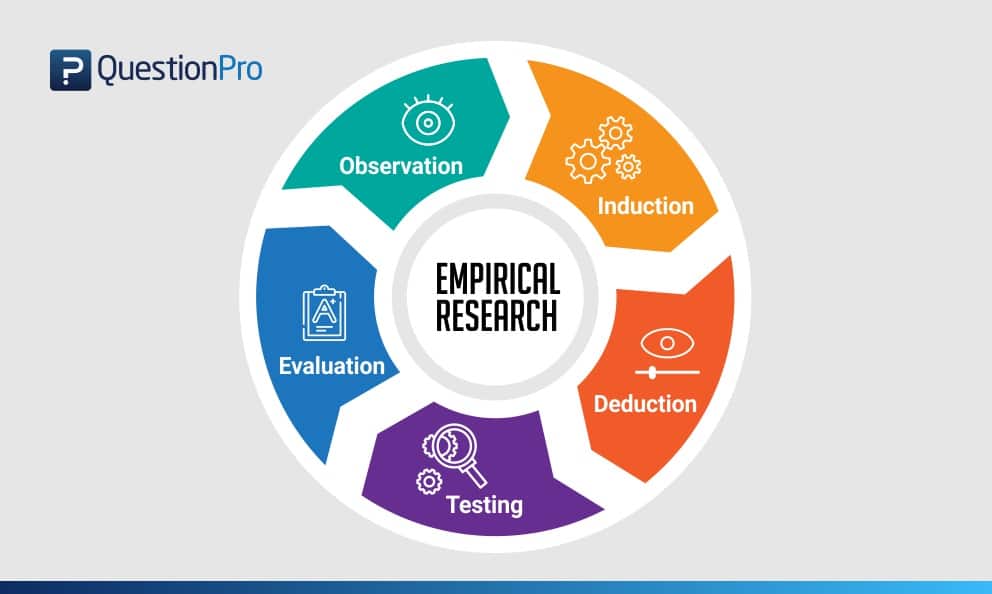
Empirical research is a way of learning through direct observation or experience. Instead of relying on theories or ideas alone, it gathers real-world data to understand how things work.
Researchers ask questions, conduct experiments, observe different situations, and carefully collect evidence to find answers. This method not only ensures that our beliefs are supported by facts but also reassures us that our understanding is based on solid evidence rather than mere assumptions.
In our everyday lives, we engage in informal empirical research whenever we try things and learn from the outcomes, making it an effective and relatable way to uncover the truth.
What is Empirical Research?
Empirical research depends on direct or indirect actual experience and observation as its primary source of knowledge. It focuses on collecting real-world data to answer specific research questions and solve practical problems. This method is widely used across various fields, as it helps professionals validate hypotheses with solid evidence rather than relying on assumptions.
In professional practices, empirical research is vital because it informs decisions with data-driven insights, ensuring that theories are tested and applicable in real-world scenarios.
In addition to advancing knowledge in current studies, empirical research sets a foundation for future studies. By answering specific research questions and testing new hypotheses, it continuously builds on previous findings and opens up new areas for exploration.
This empirical evidence can be gathered using quantitative market research and qualitative market research methods.
For example: A research is being conducted to find out if listening to happy music in the workplace while working may promote creativity? An experiment is conducted by using a music website survey on a set of audience who are exposed to happy music and another set who are not listening to music at all, and the subjects are then observed. The results derived from such a research will give empirical evidence if it does promote creativity or not.
Origin of Empirical Research
You must have heard the quote, “I will not believe it unless I see it.” This concept originated from the ancient empiricists, a fundamental understanding that:
- Powered the emergence of medieval science during the Renaissance period.
- Laid the foundation for modern science as we know it today.
The term “empirical” has its roots in Greek, derived from the word empirics , which means “experienced.”
In today’s world, empirical research refers to:
- The collection of data using evidence gathered through observation or experience.
- Observed and measured phenomena through experiments or by using calibrated scientific instruments.
- Reliance on previous studies and their methodology to design and validate new research.
All of these methods have one key factor in common: dependence on observation and experimentation to collect data, test hypotheses, and draw conclusions.
Empirical research can be categorized into:
- Quantitative research involves numerical data, statistical analysis, and the measurement of variables.
- Qualitative research focuses on non-numerical data and the interpretation of patterns and meanings.
In essence, empirical research relies on real-world evidence to form conclusions, distinguishing it from purely theoretical or speculative approaches.
Types And Methodologies of Empirical Research
Empirical research can be conducted and analysed using qualitative or quantitative methods.
- Quantitative research : Quantitative research methods are used to gather information through numerical data. It is used to quantify opinions, behaviors or other defined variables . These are predetermined and are in a more structured format. Some of the commonly used methods are survey, longitudinal studies, polls, etc
- Qualitative research: Qualitative research methods are used to gather non numerical data. It is used to find meanings, opinions, or the underlying reasons from its subjects. These methods are unstructured or semi structured. The sample size for such a research is usually small and it is a conversational type of method to provide more insight or in-depth information about the problem Some of the most popular forms of methods are focus groups, experiments, interviews, etc.
Data collected from these will need to be analysed. Empirical evidence can also be analysed either quantitatively and qualitatively. Using this, the researcher can answer empirical questions which have to be clearly defined and answerable with the findings he has got.
The type of research design used will vary depending on the field in which it is going to be used. Many of them might choose to do a collective research involving quantitative and qualitative method to better answer questions which cannot be studied in a laboratory setting.
Quantitative Research Methods
Quantitative research methods aid in analyzing the empirical evidence gathered. By using these a researcher can find out if his hypothesis is supported or not.
1. Survey Research
Survey research generally involves a large audience to collect a large amount of data. This is a quantitative method having a predetermined set of closed questions which are pretty easy to answer. Because of the simplicity of such a method, high responses are achieved. It is one of the most commonly used methods for all kinds of research in today’s world.
Previously, surveys were taken face to face only with maybe a recorder. However, with advancement in technology and for ease, new mediums such as emails , or social media have emerged.
For example: Depletion of energy resources is a growing concern and hence there is a need for awareness about renewable energy. According to recent studies, fossil fuels still account for around 80% of energy consumption in the United States. Even though there is a rise in the use of green energy every year, there are certain parameters because of which the general population is still not opting for green energy.
In order to understand why, a survey can be conducted to gather opinions of the general population about green energy and the factors that influence their choice of switching to renewable energy. Such a survey can help institutions or governing bodies to promote appropriate awareness and incentive schemes to push the use of greener energy.
2. Experimental Research
In experimental research , an experiment is set up and a hypothesis is tested by creating a situation in which one of the variable is manipulated. This is also used to check cause and effect. It is tested to see what happens to the independent variable if the other one is removed or altered. The process for such a method is usually proposing a hypothesis, experimenting on it, analyzing the findings and reporting the findings to understand if it supports the theory or not.
For example: A particular product company is trying to find what is the reason for them to not be able to capture the market. So the organisation makes changes in each one of the processes like manufacturing, marketing, sales and operations. Through the experiment they understand that sales training directly impacts the market coverage for their product. If the person is trained well, then the product will have better coverage.
3. Correlational Research
Correlational research is used to find relation between two set of variables . Regression analysis is generally used to predict outcomes of such a method. It can be positive, negative or neutral correlation.
For example: Higher educated individuals will get higher paying jobs. This means higher education enables the individual to high paying job and less education will lead to lower paying jobs.
4. Longitudinal Study
Longitudinal study is used to understand the traits or behavior of a subject under observation after repeatedly testing the subject over a period of time. Data collected from such a method can be qualitative or quantitative in nature.
For example: A research to find out benefits of exercise. The target is asked to exercise everyday for a particular period of time and the results show higher endurance, stamina, and muscle growth. This supports the fact that exercise benefits an individual body.
5. Cross Sectional
Cross sectional study is an observational type of method, in which a set of audience is observed at a given point in time. In this type, the set of people are chosen in a fashion which depicts similarity in all the variables except the one which is being researched.
This type does not enable the researcher to establish a cause and effect relationship as it is not observed for a continuous time period. It is majorly used by healthcare sector or the retail industry.
For example: A medical study to find the prevalence of under-nutrition disorders in kids of a given population. This will involve looking at a wide range of parameters like age, ethnicity, location, incomes and social backgrounds. If a significant number of kids coming from poor families show under-nutrition disorders, the researcher can further investigate into it. Usually a cross sectional study is followed by a longitudinal study to find out the exact reason.
6. Causal-Comparative Research
This method is based on comparison. It is mainly used to find out cause-effect relationship between two variables or even multiple variables.
For example: A researcher measured the productivity of employees in a company which gave breaks to the employees during work and compared that to the employees of the company which did not give breaks at all.
Qualitative Research Methods
Some research questions need to be analysed qualitatively, as quantitative methods are not applicable there. In many cases, in-depth information is needed or a researcher may need to observe a target audience behavior, hence the results needed are in a descriptive analysis form. Qualitative research results will be descriptive rather than predictive. It enables the researcher to build or support theories for future potential quantitative research. In such a situation qualitative research methods are used to derive a conclusion to support the theory or hypothesis being studied.
1. Case Study
Case study method is used to find more information through carefully analyzing existing cases. It is very often used for business research or to gather empirical evidence for investigation purpose. It is a method to investigate a problem within its real life context through existing cases.
The researcher has to carefully analyse making sure the parameter and variables in the existing case are the same as to the case that is being investigated. Using the findings from the case study, conclusions can be drawn regarding the topic that is being studied.
For example: A report mentioning the solution provided by a company to its client. The challenges they faced during initiation and deployment, the findings of the case and solutions they offered for the problems. Such case studies are used by most companies as it forms an empirical evidence for the company to promote in order to get more business.
2. Observational Method
Observational method is a process to observe and gather data from its target. Since it is a qualitative method it is time consuming and very personal. It can be said that observational research method is a part of ethnographic research which is also used to gather empirical evidence. This is usually a qualitative form of research, however in some cases it can be quantitative as well depending on what is being studied.
For example: setting up a research to observe a particular animal in the rain-forests of amazon. Such a research usually take a lot of time as observation has to be done for a set amount of time to study patterns or behavior of the subject. Another example used widely nowadays is to observe people shopping in a mall to figure out buying behavior of consumers.

3. One-on-one Interview
Such a method is purely qualitative and one of the most widely used. The reason being it enables a researcher get precise meaningful data if the right questions are asked. It is a conversational method where in-depth data can be gathered depending on where the conversation leads.
For example: A one-on-one interview with the finance minister to gather data on financial policies of the country and its implications on the public.
4. Focus Groups
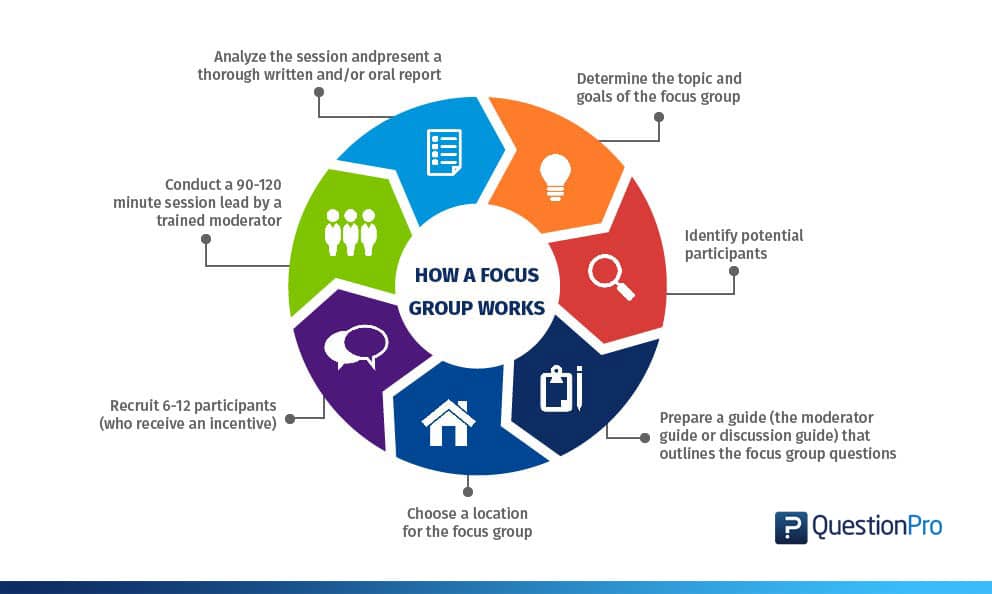
Focus groups are used when a researcher wants to find answers to why, what and how questions. A small group is generally chosen for such a method and it is not necessary to interact with the group in person. A moderator is generally needed in case the group is being addressed in person. This is widely used by product companies to collect data about their brands and the product.
For example: A mobile phone manufacturer wanting to have a feedback on the dimensions of one of their models which is yet to be launched. Such studies help the company meet the demand of the customer and position their model appropriately in the market.
5. Text Analysis
Text analysis method is a little new compared to the other types. Such a method is used to analyse social life by going through images or words used by the individual. In today’s world, with social media playing a major part of everyone’s life, such a method enables the research to follow the pattern that relates to his study.
For example: A lot of companies ask for feedback from the customer in detail mentioning how satisfied are they with their customer support team. Such data enables the researcher to take appropriate decisions to make their support team better.
Sometimes a combination of the methods is also needed for some questions that cannot be answered using only one type of method especially when a researcher needs to gain a complete understanding of complex subject matter.
We recently published a blog that talks about examples of qualitative data in education ; why don’t you check it out for more ideas?
Learn More: Data Collection Methods: Types & Examples
Steps of Conducting Empirical Research
Since empirical research is based on observation and capturing experiences, it is important to plan the steps to conduct the experiment and how to analyse it. This will enable the researcher to resolve problems or obstacles which can occur during the experiment.
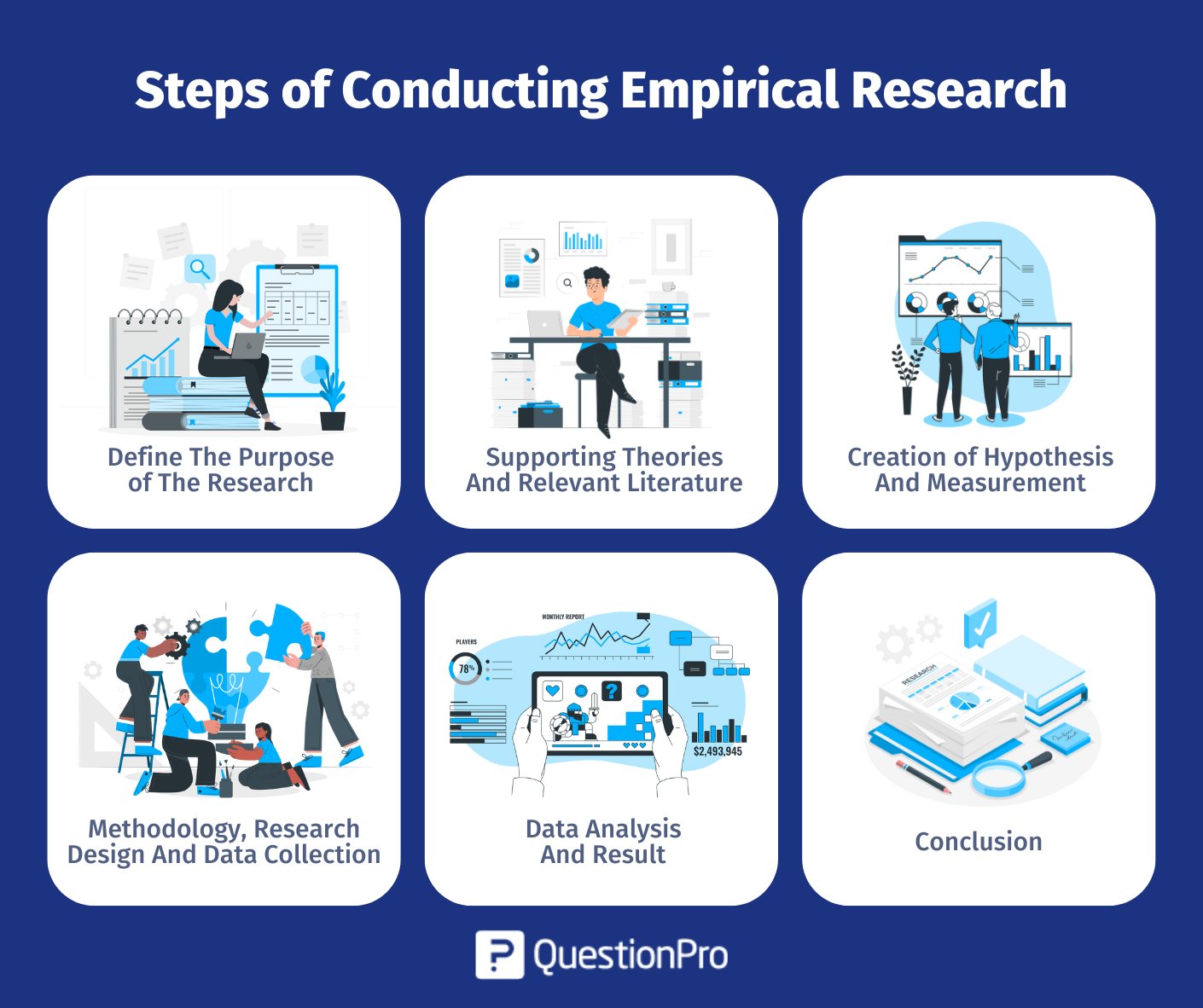
Step #1: Define The Purpose of The Research
This is the step where the researcher has to answer questions like what exactly do I want to find out? What is the problem statement? Are there any issues in terms of the availability of knowledge, data, time or resources. Will this research be more beneficial than what it will cost.
Before going ahead, a researcher has to clearly define his purpose for the research and set up a plan to carry out further tasks.
Step #2 : Supporting Theories And Relevant Literature
The researcher needs to find out if there are theories which can be linked to his research problem . He has to figure out if any theory can help him support his findings. All kind of relevant literature will help the researcher to find if there are others who have researched this before, or what are the problems faced during this research. The researcher will also have to set up assumptions and also find out if there is any history regarding his research problem
Step #3: Creation of Hypothesis And Measurement
Before beginning the actual research he needs to provide himself a working hypothesis or guess what will be the probable result. Researcher has to set up variables, decide the environment for the research and find out how can he relate between the variables.
Researcher will also need to define the units of measurements, tolerable degree for errors, and find out if the measurement chosen will be acceptable by others.
Step #4: Methodology, Research Design And Data Collection
In this step, the researcher has to define a strategy for conducting his research. He has to set up experiments to collect data which will enable him to propose the hypothesis. The researcher will decide whether he will need experimental or non experimental method for conducting the research. The type of research design will vary depending on the field in which the research is being conducted.
Last but not the least, the researcher will have to find out parameters that will affect the validity of the research design. Data collection will need to be done by choosing appropriate samples depending on the research question. To carry out the research, he can use one of the many sampling techniques. Once data collection is complete, researcher will have empirical data which needs to be analysed.
Step #5: Data Analysis And Result
Data analysis can be done in two ways, qualitatively and quantitatively. Researcher will need to find out what qualitative method or quantitative method will be needed or will he need a combination of both. Depending on the unit of analysis of his data, he will know if his hypothesis is supported or rejected. Analyzing this data is the most important part to support his hypothesis.
Step #6: Conclusion
A report will need to be made with the findings of the research. The researcher can give the theories and literature that support his research. He can make suggestions or recommendations for further research on his topic.
Empirical Research Methodology Cycle
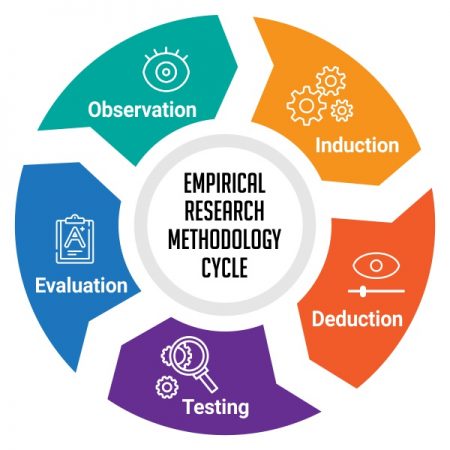
A.D. de Groot, a famous dutch psychologist and a chess expert conducted some of the most notable experiments using chess in the 1940’s. During his study, he came up with a cycle which is consistent and now widely used to conduct empirical research. It consists of 5 phases with each phase being as important as the next one.
The empirical cycle captures the process of coming up with hypothesis about how certain subjects work or behave and then testing these hypothesis against empirical data in a systematic and rigorous approach. It can be said that it characterizes the deductive approach to science. Following is the empirical cycle.
1. Observation
At this phase an idea is sparked for proposing a hypothesis. During this phase empirical data is gathered using observation. For example: a particular species of flower bloom in a different color only during a specific season.
2. Induction
Inductive reasoning is then carried out to form a general conclusion from the data gathered through observation. For example: As stated above it is observed that the species of flower blooms in a different color during a specific season. A researcher may ask a question “does the temperature in the season cause the color change in the flower?” He can assume that is the case, however it is a mere conjecture and hence an experiment needs to be set up to support this hypothesis. So he tags a few set of flowers kept at a different temperature and observes if they still change the color?
3. Deduction
This phase helps the researcher to deduce a conclusion out of his experiment. This has to be based on logic and rationality to come up with specific unbiased results.For example: In the experiment, if the tagged flowers in a different temperature environment do not change the color then it can be concluded that temperature plays a role in changing the color of the bloom.
This phase involves the researcher to return to empirical methods to put his hypothesis to the testing instruments. The researcher now needs to make sense of his data and hence needs to use statistical analysis plans to determine the temperature and bloom color relationship. If the researcher finds out that most flowers bloom a different color when exposed to the certain temperature and the others do not when the temperature is different, he has found support to his hypothesis. Please note this not proof but just a support to his hypothesis.
5. Evaluation
This phase is generally forgotten by most but is an important one to keep gaining knowledge. During this phase the researcher puts forth the data he has collected, the support argument and his conclusion. The researcher also states the limitations for the experiment and his hypothesis and suggests tips for others to pick it up and continue a more in-depth research for others in the future.
Pros and Cons of Empirical Research
As you may have noticed, empirical research has a lot to offer anyone who wants to conduct research and take advantage of its benefits. However, it is essential to consider not only the benefits but also the limitations and possible disadvantages you may encounter when using this methodology.
Below, we will explain both aspects a bit more so that you can consider them when conducting your research using this method.
Advantages of Empirical Research
There is a reason why empirical research is one of the most widely used method. There are a few advantages associated with it. Following are a few of them.
- It is used to authenticate traditional research through various experiments and observations.
- This research methodology makes the research being conducted more competent and authentic.
- It enables a researcher understand the dynamic changes that can happen and change his strategy accordingly.
- The level of control in such a research is high so the researcher can control multiple variables.
- It plays a vital role in increasing internal validity .
Disadvantages of Empirical Research
Even though empirical research makes the research more competent and authentic, it does have a few disadvantages. Following are a few of them.
- Such a research needs patience as it can be very time consuming. The researcher has to collect data from multiple sources and the parameters involved are quite a few, which will lead to a time consuming research.
- Most of the time, a researcher will need to conduct research at different locations or in different environments, this can lead to an expensive affair.
- There are a few rules in which experiments can be performed and hence permissions are needed. Many a times, it is very difficult to get certain permissions to carry out different methods of this research.
- Collection of data can be a problem sometimes, as it has to be collected from a variety of sources through different methods.
Empirical Research Vs Non-Empirical Research
Empirical and non-empirical research are two fundamental approaches in research methodology. Understanding their key differences helps researchers choose the appropriate method based on their research objectives.
Both empirical and non-empirical research offers valuable insights and contribute uniquely to knowledge. Together, they form a comprehensive approach to exploring, explaining, and expanding knowledge across disciplines.
Why is There a Need for Empirical Research?
Empirical research is important today because most people believe in something only when they can see, hear, or experience it. It is used to validate multiple hypotheses, derive knowledge, and increase human understanding, and it is continuing to do so to advance in various fields.
This often involves using testing instruments to ensure the accuracy and reliability of data collection, especially when it comes to complex variables.
In addition, research participants’ discussion often plays a key role in understanding the results and validating the findings within a theoretical framework that guides the entire study.
Qualitative methods are frequently used to gain deeper insights into participants’ perspectives, helping to contextualize empirical data. A literature review, or multiple literature reviews, also helps ground the research in existing knowledge, linking the new findings with past studies.
For example , pharmaceutical companies use empirical research to test specific drugs on controlled or random groups, using both qualitative methods and testing instruments to study cause and effect. This way, they prove certain theories they had proposed for the specific drug.
Such research is very important, as sometimes it can lead to finding a cure for a long-standing disease. In addition, the use of statistical data is essential for validating results and ensuring their reliability. Empirical research is useful in science, social sciences, business, and many other fields, like history, deriving knowledge through quantitative and qualitative methods.
Use QuestionPro Research Suite for Empirical Research
Using QuestionPro Research Suite for empirical research makes the process easier and more efficient. Here’s why:

01. User-Friendly Data Collection Tools
QuestionPro’s suite of tools, including surveys, polls, and questionnaires, are designed with user-friendliness in mind, making it a breeze to gather real-world data from diverse sources.
02. Highly Customizable
This lets you personalize surveys per your research requirements, ensuring the collected data is always relevant and valuable.
03. Real-Time Analytics
Get immediate feedback with QuestionPro real-time analytics to see trends and patterns in your data immediately
4. Even Better Data Management
The most efficient way of managing large sets of data is to keep the analysis and its outcomes faster and more reliable.
Overall, QuestionPro simplifies the empirical research process and allows you to focus more on data analysis and interpretation than manual collection and organization.
Conclusion About Empirical Research
Empirical research is a tool for understanding data and deducing its meaning. By focusing on what can be measured or experienced, we are better equipped to think critically and develop practical solutions.
When identifying empirical research, we focus on real-world data and its key characteristics, such as observation, experimentation, and evidence-based conclusions. The research process involves careful data collection, analysis, and the ability to communicate empirical research findings.
In doing so, we can make sense of the data and our feelings, leading to more informed decisions. Ultimately, empirical research enables us to transition from mere assumptions to solid evidence. Identifying patterns and validating hypotheses can improve outcomes in scientific and daily fields.
LEARN MORE FREE TRIAL
Frequently Asked Questions( FAQs)
Empirical research is a type of study that relies on observation, experience, or experimentation to gather data. It involves collecting evidence through direct or indirect observation of real-world phenomena and analyzing that data to form conclusions, often using scientific methods such as experiments or surveys.
Examples of empirical research include: 1. Conducting experiments to test a scientific hypothesis. 2. Surveying individuals to gather opinions or behaviors. 3. Observing wildlife in their natural environment. 4. Measuring the effects of a treatment in a clinical trial. 5. Analyzing historical data to identify trends or patterns.
Empirical research relies on observation and data collection through experiments or real-world evidence, whether quantitative (numerical) or qualitative (non-numerical). Qualitative research , a subset of empirical research, focuses specifically on understanding patterns, behaviors, and experiences through non-numerical data like interviews, observations, or texts.
MORE LIKE THIS
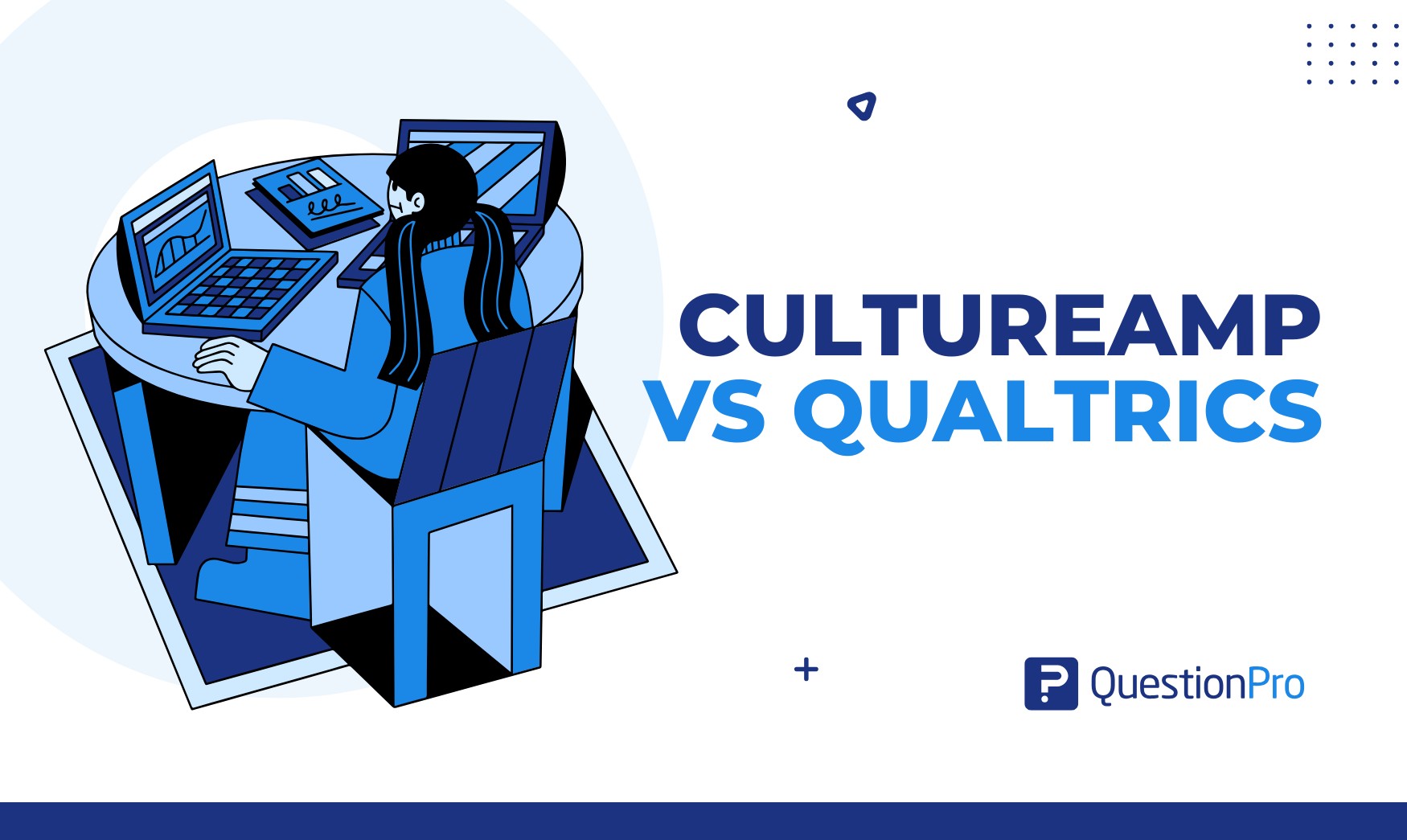
CultureAmp vs Qualtrics: The Best Employee Experience Platform
Dec 16, 2024
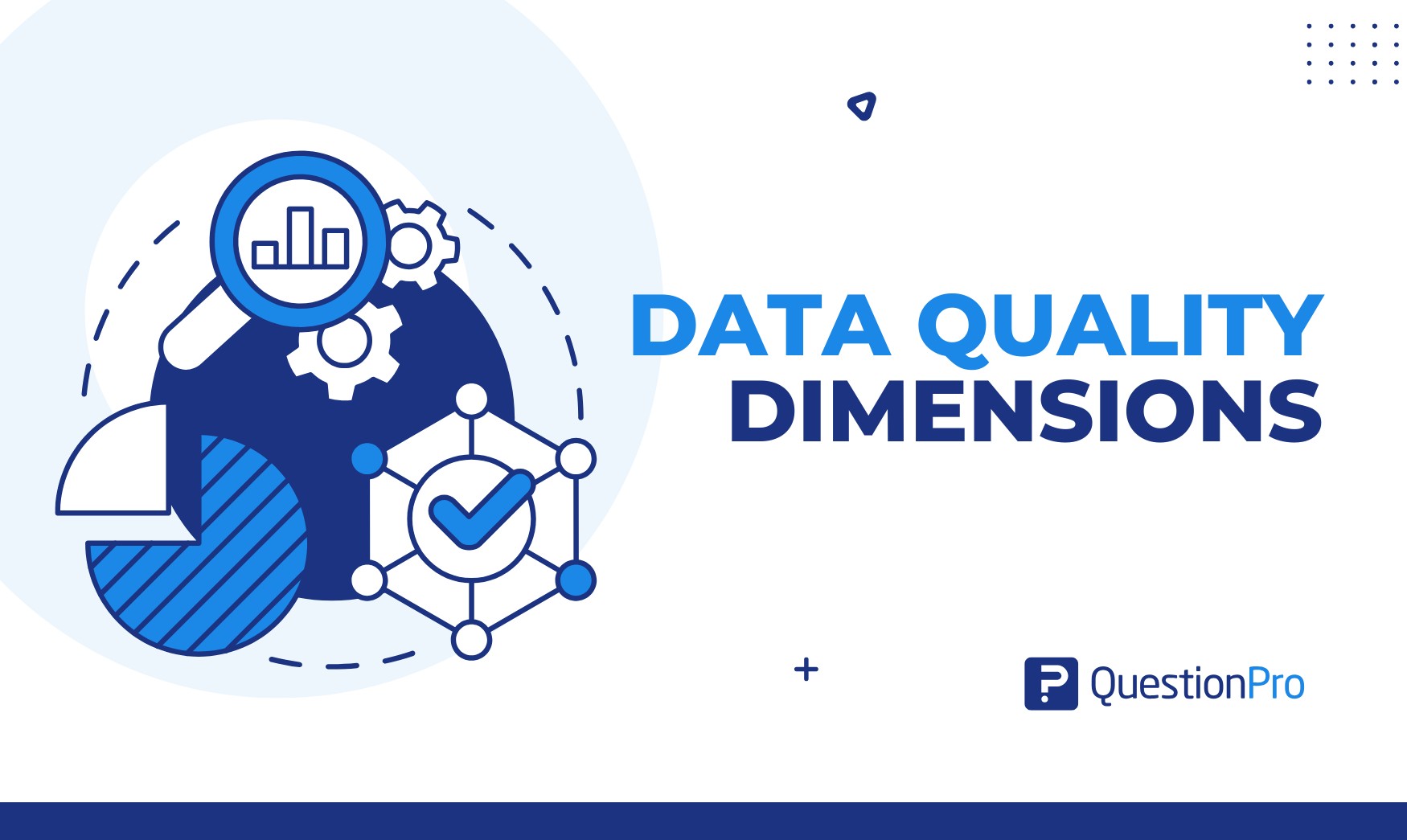
Data Quality Dimensions: What are They & How to Improve
Dec 10, 2024
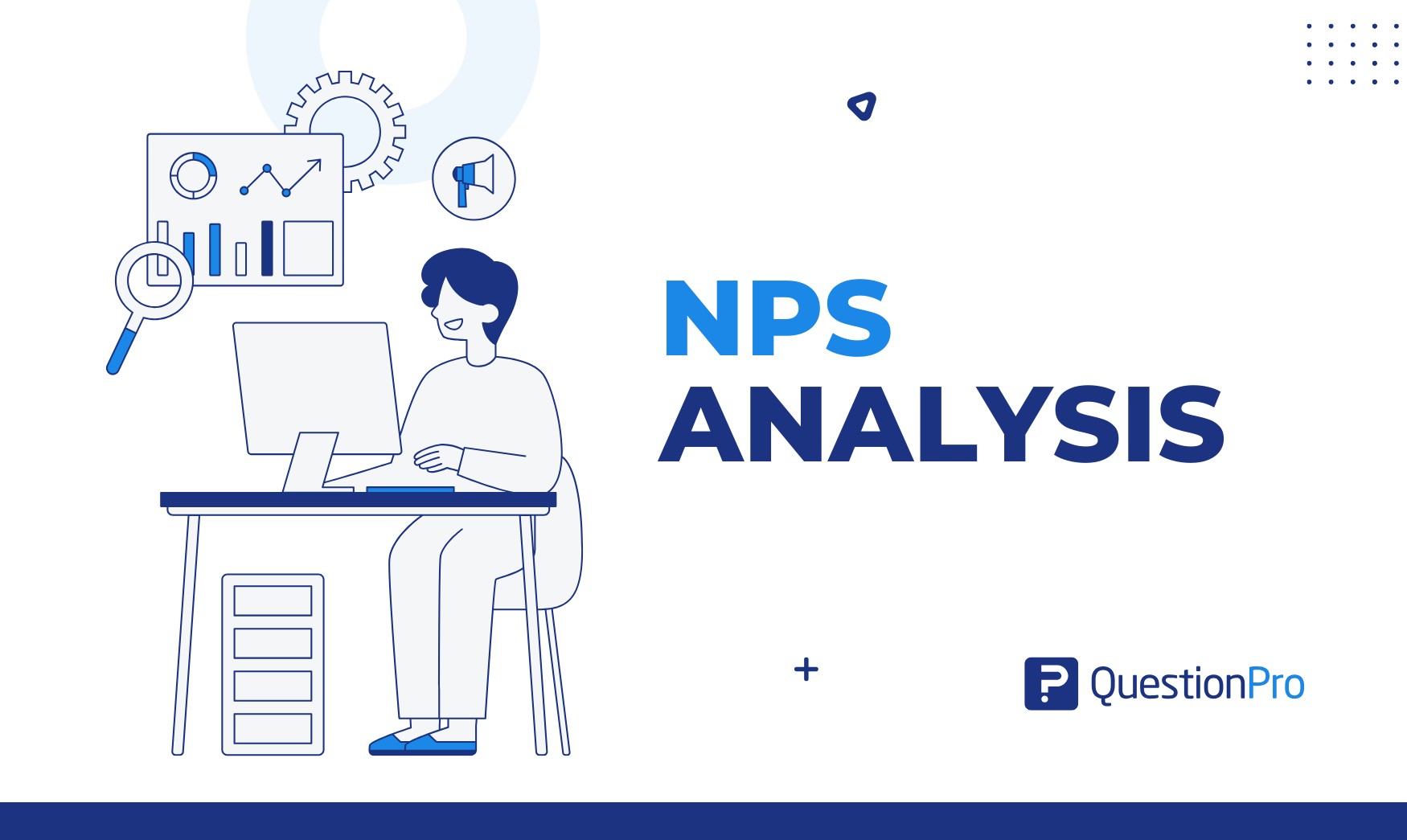
NPS Analysis: Boosting Customer Retention and Satisfaction
Dec 9, 2024
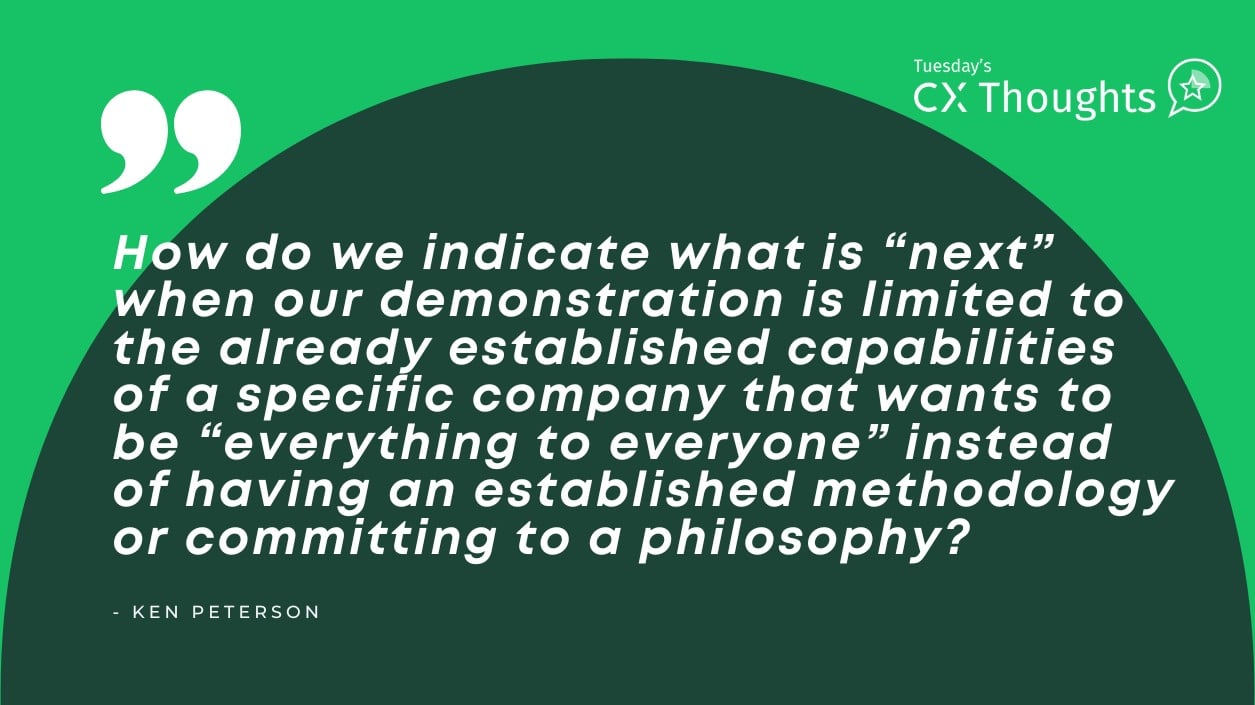
What Can We Expect Next? — Tuesday CX Thoughts
Dec 3, 2024
Other categories
- Academic Research
- Artificial Intelligence
- Assessments
- Brand Awareness
- Case Studies
- Communities
- Consumer Insights
- Customer effort score
- Customer Engagement
- Customer Experience
- Customer Loyalty
- Customer Research
- Customer Satisfaction
- Employee Benefits
- Employee Engagement
- Employee Retention
- Friday Five
- General Data Protection Regulation
- Insights Hub
- Life@QuestionPro
- Market Research
- Mobile diaries
- Mobile Surveys
- New Features
- Online Communities
- Question Types
- Questionnaire
- QuestionPro Products
- Release Notes
- Research Tools and Apps
- Revenue at Risk
- Survey Templates
- Training Tips
- Tuesday CX Thoughts (TCXT)
- Uncategorized
- What’s Coming Up
- Workforce Intelligence
- Daily Crossword
- Word Puzzle
- Word Finder
- Word of the Day
- Synonym of the Day
- Word of the Year
- Language stories
- All featured
- Gender and sexuality
- All pop culture
- Writing hub
- Grammar essentials
- Commonly confused
- All writing tips
- Pop culture
- Writing tips
- Word comparison: empirical vs. theoretical
empirical vs. theoretical
Empirical vs. theoretical: what's the difference.
Empirical means based on observations or experience. Theoretical means based on theories and hypotheses. The two terms are often used in scientific practice to refer to data, methods, or probabilities.
Empirical evidence of changes in kelp consumption was gathered by measuring the bite marks in seaweed fronds.
Synonyms: pragmatic , firsthand , practical
Antonyms: theoretical , secondhand
That is nothing but an empirical conclusion with no regard for the laws of thermodynamics.
Theoretical physics is criticized for producing complex concepts that are mathematical, not empirical.
theoretical
- of, relating to, or consisting in theory ; not practical ( applied ).
- existing only in theory; hypothetical .
- given to, forming, or dealing with theories; speculative .

- Theory vs Empirical: Unveiling the Truth through Data and Observation
Delve into the intriguing debate between theory and empirical evidence as we explore how data and observation shape our understanding of the world. Discover the power of theoretical frameworks versus real-world data , and how each plays a crucial role in deciphering complex phenomena. Join us on a journey to uncover the truth behind theories and empirical evidence, and gain a deeper appreciation for the interplay between speculation and observation .
What is the difference between theory and empirical data: Uncover the contrast.
What is theory and empirical observation - beginnings of exploration, frequently asked questions (faq).
Theory vs. Empirical Data: Uncovering the Contrast
In the realm of academia and research, a theory is a systematically organized body of knowledge that explains certain phenomena. It is a set of principles or statements devised to explain a group of facts or phenomena, often forming the basis for further study or research in a particular field. Theoretical frameworks provide researchers with a lens through which to interpret and understand the world.
Empirical Data
Empirical data , on the other hand, refers to information that is acquired through observation or experimentation. It is data that is based on real-world experience and sensory information. Empirical evidence is gathered directly or indirectly through the senses and is crucial in testing the validity of theories.
Differences
One of the key distinctions between theory and empirical data lies in their origins. Theories are conceptual frameworks developed through abstract reasoning and analysis, whereas empirical data is grounded in practical observation and experimentation. Theories provide the overarching structure, while empirical data serves as the concrete evidence that either supports or refutes theoretical claims.
Furthermore, theories are inherently explanatory and predictive in nature, aiming to provide a comprehensive understanding of a phenomenon. In contrast, empirical data is focused on the collection of observable facts and evidence that can be used to validate or invalidate theoretical propositions. Theories offer a framework for interpreting empirical data, guiding the research process and facilitating the formation of hypotheses.
In essence, theories and empirical data complement each other in the research process. Theories provide the conceptual foundation and framework for inquiry, while empirical data serves as the empirical testing ground that validates or challenges theoretical assumptions. It is through this dynamic interplay between theory and empirical data that knowledge advances and our understanding of the world deepens.
Theory and Empirical Observation: Beginnings of Exploration

Empirical observation is the gathering of information by direct observation, experience, or experiment.

It is a crucial aspect of the scientific method and provides the data needed to test and validate theories. The combination of theory and empirical observation forms the backbone of scientific inquiry and exploration.
What is the relationship between theory and empirical evidence - Exploring their connection
The relationship between theory and empirical evidence:
In the realm of academia and research, the relationship between theory and empirical evidence is a crucial one. Theories serve as frameworks of understanding, providing explanations and predictions about various phenomena. Empirical evidence, on the other hand, is the tangible data that is collected through observations or experiments to either support or refute these theories.
The connection between theory and empirical evidence:
Empirical evidence plays a vital role in validating or invalidating theories . It serves as the foundation for testing hypotheses and determining the accuracy of theoretical predictions. Without empirical evidence, theories remain unproven hypotheses, lacking the supporting data necessary to establish credibility.
The importance of empirical evidence in theory:
Empirical evidence is essential for grounding theories in reality . It provides the observable facts and data that either confirm or challenge theoretical assumptions. The process of collecting empirical evidence allows researchers to evaluate the validity of a theory and make necessary adjustments based on real-world observations.
What is the difference between a theory of development and an empirical study:
Theory of Development: A theory of development is a broad explanation or model outlining how and why a certain process occurs over time. It is a conceptual framework that seeks to make sense of patterns and changes in developmental processes. Theories of development are based on existing knowledge, research, and observations to propose hypotheses about how individuals grow, learn, and change throughout their lives.
Empirical Study: An empirical study, on the other hand, involves the systematic collection and analysis of data to test specific hypotheses or research questions. This type of study relies on direct observation or experience to provide evidence for or against a particular theory or idea. Empirical studies are grounded in real-world data and aim to validate or refute theoretical predictions through scientific investigation.
Difference: The key difference between a theory of development and an empirical study lies in their nature and purpose. A theory of development is a theoretical framework that aims to explain a phenomenon, while an empirical study is a research method used to gather data and test hypotheses derived from theories. Theories provide a conceptual basis for understanding development, whereas empirical studies offer concrete evidence to support or challenge these theoretical explanations.
What is the difference between theory and empirical evidence?
Theory is based on concepts and ideas, while empirical evidence is gathered through observation and data collection.
How do theories and empirical research complement each other?
Theories provide a framework for understanding phenomena, while empirical research tests these theories using real-world data and observations.
Why is it important to balance theory and empirical evidence in research?
By combining theory with empirical evidence, researchers can develop robust explanations and make informed conclusions based on both conceptual frameworks and real-world observations.
Can research be conducted without the integration of theory and empirical evidence?
While research can be conducted without one or the other, the integration of theory and empirical evidence leads to more comprehensive and credible findings that contribute to a deeper understanding of the subject matter.
If you want to know other articles similar to Theory vs Empirical: Unveiling the Truth through Data and Observation you can visit the category Science .
Related posts
The Iceberg Theory: Unveiling Hidden Depths
Unlocking the Mysteries: Quantum Realm Theory Unveiled
Shine Theory: Igniting Your Inner Spark for Lasting Success!
Unlocking the Alchemy of Computation:
Examining Critical Race Theory in Mathematics: A Deeper Understanding
The Ethological Theory: Decoding Animal Behavior for Deeper Understanding
Colorado College
Research guides.
Tutt Library Research Guides

- Find Articles
- Search Tips
- Empirical v. Theoretical
- Credibility
- Position Papers
- Curricular Education Databases
- Statistics & Data
- Streaming Films & DVDs
- Print Books
- Professional Development & Careers
- Citation Guide This link opens in a new window
- ED 101 Information
Empirical or Theoretical?
Empirical: Based on data gathered by original experiments or observations.
Theoretical: Analyzes and makes connections between empirical studies to define or advance a theoretical position.
Videos on Finding Empirical Articles
Where Can I Find Empirically-Based Education Articles?
The most direct route is to search PsycInfo, linked above.
This will take you to the Advanced Search, where you can type in your key words at the top. Then scroll down through all the limiting options to the Methodology menu. Select Empirical Study.

In other databases without the Methodology limiter, such as Education Source , try keywords like empirical , study , and research .
How Can I Tell if an Article is Empirical?
Check for these components:
- Peer-reviewed
- Charts, graphs, tables, and/or statistical analyses
- More than 5 pages
- Sections with names like: Abstract, Introduction, Literature Review, Method, Data, Analysis, Results, Discussion, References
Look for visual cues of data collection and analysis:

- << Previous: Search Tips
- Next: Credibility >>
- Last Updated: Oct 2, 2024 1:11 PM
- URL: https://coloradocollege.libguides.com/education

IMAGES
COMMENTS
Theoretical vs Empirical Research. Theoretical research is often seen as the starting point for empirical research, providing the ideas and models that must be tested and validated. Theoretical research can be qualitative or quantitative and involve mathematical models, simulations, and other computational methods. ...
While theoretical and empirical research may seem distinct, they are deeply interconnected. Theoretical frameworks often guide empirical research by providing hypotheses to test. Conversely, empirical findings can challenge existing theories, leading to their refinement or the development of new theories. This dynamic relationship ensures the ...
Theoretical Research is a logical exploration of a system of beliefs and assumptions, working with abstract principles related to a field of knowledge. Essentially...theorizing; vs. Empirical Research is based on real-life direct or indirect observation and measurement of phenomena by a researcher. Basically...
A theoretical framework provides a general set of ideas that can help to guide future research by providing predictions that can be tested. Empirical research will gather data to support or refute theoretical predictions, adding to the body of knowledge with concrete findings.
Conceptual research provides the theoretical foundation and guidance for empirical investigations, while empirical research validates and refines existing theories or concepts. The iterative nature of research often involves a continuous cycle of conceptual and empirical research, with each informing and influencing the other.
Empirical Research: Non-Empirical Research: Definition: Based on observed and measured phenomena. Based on existing knowledge, logic, and reasoning. Data Collection: Directly gathers new data through experiments, surveys, or observations. Uses secondary data, theoretical analysis, or literature reviews. Analysis: Quantitative, often statistical.
Theoretical frameworks are utilized when a well-established theory can be directly applied to a research problem, often used to interpret data after empirical research. Both frameworks aim to clarify relationships among key variables and guide the research process, providing structured approaches to understanding the studied phenomena.
empirical vs. theoretical: What's the difference? Empirical means based on observations or experience. Theoretical means based on theories and hypotheses. The two terms are often used in scientific practice to refer to data, methods, or probabilities. empirical. adjective.
Delve into the intriguing debate between theory and empirical evidence as we explore how data and observation shape our understanding of the world. Discover the power of theoretical frameworks versus real-world data, and how each plays a crucial role in deciphering complex phenomena.Join us on a journey to uncover the truth behind theories and empirical evidence, and gain a deeper appreciation ...
This will take you to the Advanced Search, where you can type in your key words at the top. Then scroll down through all the limiting options to the Methodology menu. Select Empirical Study. In other databases without the Methodology limiter, such as Education Source, try keywords like empirical, study, and research.